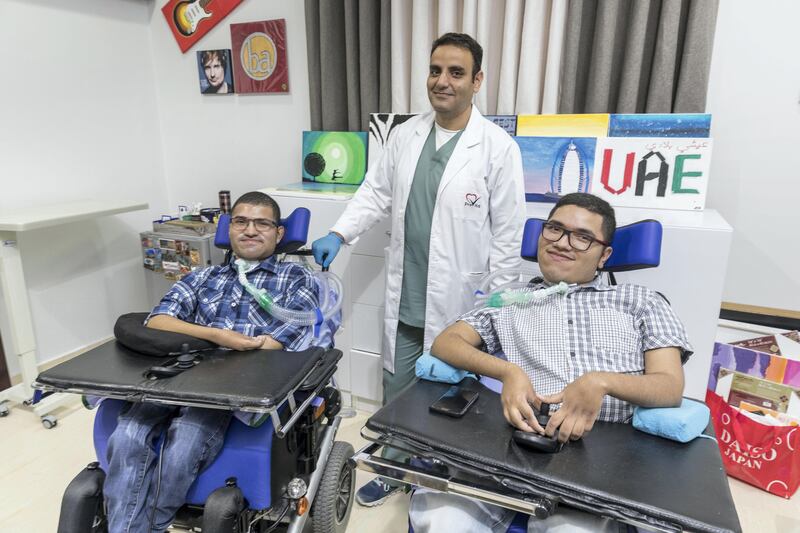Watching Emirati brothers Mohammed and Mazen Al Alawi arguing over their favourite football team and talking excitedly about attending a Real Madrid match in the UAE next month, it is hard to believe that they both suffer from a terminal illness.
Mohammed, 24, and 20-year-old Mazen suffer from a severe form of muscular dystrophy that affects just 1 in 4,000 people worldwide – Duchenne muscular dystrophy. The symptoms usually begin around the age of four in boys and worsen quickly until it affects the heart muscles.
Average life expectancy is 25 years, and already the brothers are in the latter stages of the disease, where their respiratory muscles are affected and they require a ventilator. They can no longer sit, stand or move on their own and yet they play on their games consoles, paint, study and go to the cinema. If not for the wheelchairs and ventilators, they resemble any other Emirati their age.
However, four years ago, Mohammed was lying in a bed in a hospital, since he required a ventilator, and Mazen was at home.
“I didn’t see my brother for almost four years and I was left to die,” said Mohammed.
When Mazen ended up needing a ventilator too, the family decided to move both brothers to ProVita medical centre in Al Ain, where they were reunited for the first time in four years.
“It was February 6, 2014. I will never forget the day. I hadn’t seen my brother in four years and we were all crying,” says Mohammed.
At ProVita the brothers were inseparable, sharing a room for over a year and sitting up on a chair for the first time.
___________________________
Read more:
[ Emirati describes year-long recovery battle after contracting crippling immune disease ]
[ Many injured in UAE road crashes face a lifetime in care facilities ]
___________________________
“I spend my entire day with my brother,” says Mazen, “and that’s how we were when we were kids. We were always together. When we were separated it felt like a part of me was missing.”
Dr Umar Shah, who has been caring for the brothers since their arrival at ProVita, said: “Their life expectancy is often not more than 25 but with proper care it can go up to their late 30s.
“Before they came to ProVita, they were bedridden, depressed and were not talking. They might not live till 30 but is that the life you want for them? They sat up for the first time at the centre – have hobbies – go out and have an active social life.
“Many of our patients might have limited time to live and, while we might not be able to influence that, what we can do is make sure that the time they have left is filled with joy, family interactions and living out their dreams.”
Umm Hamed has two children at ProVita - a four-year-old son, Hamad Al Eissaei, who went into a coma after swallowing and choking on a small piece of plastic when he was less than a year old and daughter Salama, 3, who suffers from a chromosomal condition that causes severe defects – trisomy 13. Her son has not awoken from the coma and her daughter will not survive. In the unlikely event that she does, she will have developed cancers and severe disabilities.
“My children were left to die in hospitals. Hamad had a tube in his throat that had a hole in it and it wasn’t changed in three months,” the mother said.
That is only one of the many “mistakes” that occurred at the hospital, she said.
“When I heard that we had long-term care centres in Al Ain, I moved them immediately. I know that Hamad might never wake up and Salama is now blind and deaf and she might die soon but their hearts are still beating and they can feel.
“Hamad’s entire neck and body was covered in bed sores when he was in the hospital. As soon as he arrived here, the doctors treated it immediately and he doesn’t have a single bed sore. The situation is hard on any mother and seeing them not being properly cared for and neglected makes it even worse.
"However, the care my children receive here is like nowhere else. I come to see them every day and spend the whole day with them and, when I go home, I know that they are well cared for. This is my second home and the nurses have become our family. Inshallah, one day Hamad will wake up, and when he does, I'll be right by his side."





